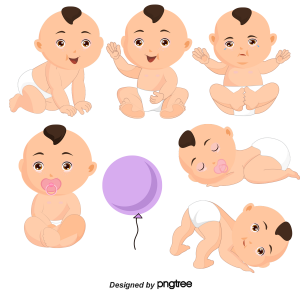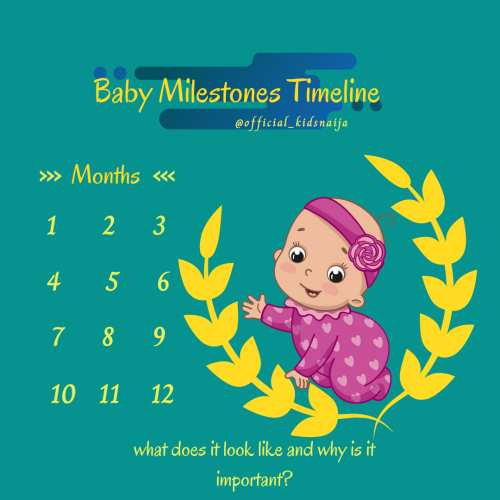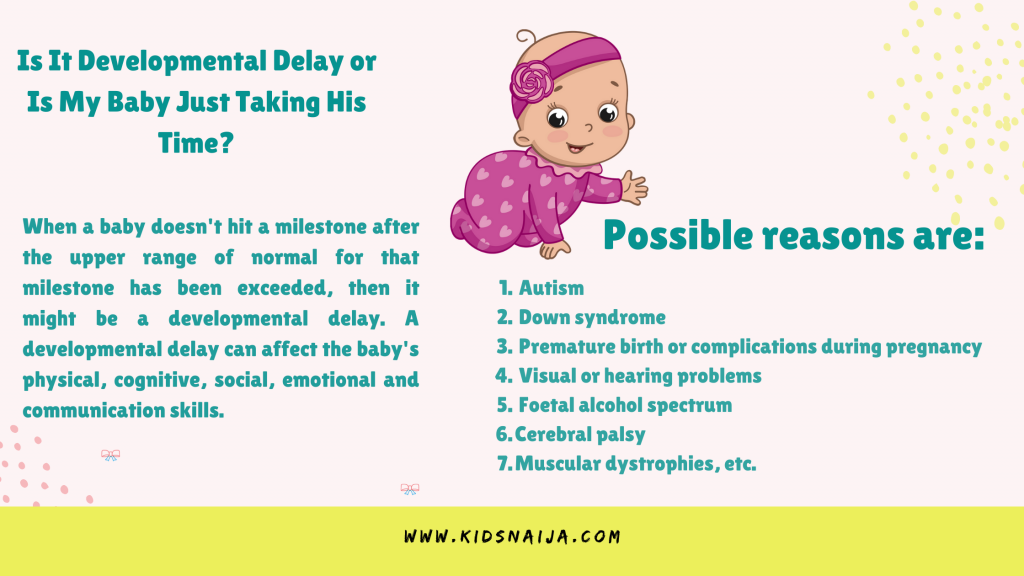Why should you be up-to-date with your baby milestones timeline? There are a lot of reasons why a timeline matters and the best two are: it’s a great way to capture memories and to spot developmental delays earlier on.
It’s okay to be worried about your baby developing well and at the right time. However, many parents tend to obsess about their babies reaching each milestone as dictated by the milestone chart. Don’t be. You shouldn’t be obsessed about your baby hitting the milestones against the milestone chart – because each baby is different.
Think of baby milestones as a spectrum because that’s exactly what they are. If the milestone chart says a milestone is to be expected at 5 months, be braced to see it way before or after that date. The spectrum can be wide or narrow, hence baby A will walk at 9 months while baby B will walk at 15 months but they’re both healthy.
What Count as Developmental Milestones for Babies

Developmental milestones or baby milestones are physical, social, emotional, cognitive and communication checkpoints babies reach as they grow. Milestones are usually in age ranges because each baby grows differently. Some babies are ahead of the baby developmental milestone checklist, some keep up with the checklist while others like to take their time.
Milestones are usually classified into:
- Physical – Includes the gross and fine motor skills. Fine motor skills pertain to movements done with the fingers such as the pincer grasp and holding a spoon. Gross, on the other hand, include physical milestones such as sitting up, creeping, crawling, standing and walking.
- Social and Emotional – This is the beginnings of self-awareness and management (babies learn how to self-soothe), social relationships with others (as seen when babies smile back at you) and play. Yeah, right, playing is a milestone.
- Cognitive – Did you just say babies don’t think? Uhh, they do. They also learn and their ability to solve problems begin at this stage.
- Communication and language milestones – Babies communicate both verbally and nonverbally, and of course, the peak of this is their first word! But just for the record, the cries are deafening.
Why Are Developmental Milestones Important?
- Helps parents plan towards capturing their baby’s big moments such as sitting up, walking etc.
- To point out developmental delays or problems: for example, a problem with sight can be observed if the baby doesn’t start tracking objects with eyes.
- Helps to distinguish between babies with developmental delays and babies who just love to take their time!
- Hitting a milestone sooner or later doesn’t reflect giftedness or disability. Milestones represent differences in babies’ development.
Note: A baby’s personality can influence your baby milestones timeline as well – an environmentally curious child might start crawling sooner than later because they can’t sit still.
Are You Ready to Click Those Big Milestone Moments? Month-by-Month Baby Milestones

It’s practically impossible to capture every single milestone that your baby will show month by month in just this article, hence, this is the first of the milestone series!!!
Milestones, just like Lego blocks build upon each other. Your baby will have to stand before walking – one milestone leads to another. Stay in the moment and let your baby choose his milestone. Don’t be tempted to compare your child’s growth chart with another’s. Always remember that milestones have a wide range so give your child time.
However, here’s a list of the commonest milestones from month 1 to month 12.
1-Month Old Baby Milestones Timeline: Exploration of Senses
- Notices face and voice recognition
- Smiles, coos and makes other sounds
- Can’t keep hands away from eyes and mouth
- Turns head from side to side when on tummy
- Sees 8 to 12 inches away
- Grabs your finger in their palms
2-Months Old Baby Milestones
- Learns to self-soothe by sucking thumb
- Can lift head up while on tummy
- Can respond to moving objects a little bit far off
- Opens and closes hands (fist)
- Begins to visually track moving/dangling objects side by side
3-Months Old Baby Milestones
- Follows moving objects and sounds
- Enjoys play
- Can distinguish between faces
- Lifts head and chest up while on tummy
4-Months Old Baby Milestones Timeline: You Can Get Some Sleep Now!
- Shows more facial expressions like laughing and giggling
- Blows raspberries aka spit bubbles
- Reaches for toys and other objects
- Starts to roll over from chest to back, and eventually from back to the chest as well
- Begins to sleep for longer durations at night
5-Months Old Baby Milestones
- Self-entertains and makes babbling sounds
- Stares at the mirror – This actually helps to calm wailing babies. They basically go from wails to awes. Selfies do the trick as well.
- Begins to mimic sounds heard, especially giggles and babbles.
- Can hold their bottle while being fed
6-Months Old Baby Milestones Timeline: The Mobility Milestones
- Starts to sit up
- Starts creeping or crawling
- Understands simple words and mimics words
- Starts teething
7-Months Old Baby Milestones Timeline: It’s Play Time!
- Peekaboo time! and maybe a little clapping
- Loves dropping things on the floor
- May begin to respond to his name
- Begins to focus on objects both far and near and explores their environment
8-Months Old Baby Milestones Timeline: Babyproofing Just Got Realer
- Finally, it’s crawl time – tummy time aids crawling.
- Stands but holds on to something
- Picks up object and pass objects between hands
9-Month Old Baby Milestones
- Starts to point to objects
- Stranger anxiety: Baby comes off as picky to strangers – he just won’t let anyone hold him
- From babbles to mama and dada
10-Months Old Baby Milestones Timeline: More Motor Skills
- Starts to cruise around furniture
- Begin to self-feed finger foods like akara, especially with the pincer grasp
- Goes from dropping things to throwing and shaking them
- May begin to wave
11-Months Old Baby Milestones
- Might develop separation anxiety: Getting separated from a primary caregiver comes with a lot of tears!
- Takes the first step
- Begins to mimic phone calls – Quite cute until they get addicted to your phone
12-Month Old Baby Milestones Timeline: Say Hi to Toddlerhood
- Takes a few bold steps
- Waves goodbye
- Responds to simple instructions such as “come”
- Ceases to be an infant – becomes a toddler, phew, it gets tougher.
Babies and Development: Is It Developmental Delay or Just A Temporary Lag
“My baby is 7 months old and she is yet to sit up on her own”, “how long will it take my baby to start crawling”, “why is my baby not tracking moving objects?”, and many more are questions concerned parents ask about their babies’ developmental growth especially when it comes to the important milestones for babies.
Every parent most likely knows all babies grow at a different pace and that baby milestones timelines can differ widely or narrowly in babies but that doesn’t do so much to stop the worrying. Why? Because parents are also aware of developmental delays which can be indicative of serious issues.
A minor temporary delay is usually nothing to worry about especially if the child is yet to cross the upper limit of the milestone in question. However, multiple delays or multiple skipped milestones are worth worrying about.
Developmental delays are milestones delays that occur in a baby’s cognitive, emotional, motor (physical), social or language development after the child has exceeded the upper limit range of the milestone.
In other words, you shouldn’t really be worried that your baby hasn’t gotten to a milestone if your baby is yet to cross the upper range of normal for that milestone. The causes for these delays are usually unknown but could sometimes be due to:
- Genetic conditions like Down Syndrome
- Premature birth
- Pregnancy complications
- Underlying medical conditions like autism spectrum disorder, muscular dystrophies, cerebral palsy, foetal alcohol spectrum etc.
Whatever the case may be, if spotted at an early age, they can be treated and your baby will grow just fine.

How to Spot Developmental Delays Using Baby Milestones Timeline
As your baby grows, there are quite a few harmless (sometimes, frustrating) things or behaviours that might get you worried such as hiccups and colic, and that’s fine. But developmental delays, on the other hand, are more fearsome especially as they might mean trouble.
There are a few things that can indicate a delay that should warrant a visit to your baby’s paediatrician and they are:
0 – 3 Months: Talk to a healthcare provider when baby
- Shows no arm movement
- Has difficulty lifting their head up while lying flat on tummy
- Can’t visually follow a moving object
- Doesn’t react to loud noises
- Doesn’t smile or make eye contact
4 – 6 Months: Talk to a healthcare provider when baby
- Is still unable to lift their head up and visually follow moving objects
- Experiences difficulty when stretching arms forward
- Doesn’t reach for toys/objects around her
- Can’t self-soothe by bringing a hand to mouth
- Doesn’t smile, laugh or coos
- Exhibits limited arms and legs movement
7 – 9 Months: Talk to a healthcare provider when baby
- Experiences difficulty or discomfort when crawling
- Makes dominant use of just one hand
- Has no interest in colourful toys
- Doesn’t babble, respond to sounds or mimic sounds
- Do not enjoy being cuddled or played with
- Inability to sit up on their own unaided
10 – 12 Months: Talk to a healthcare provider when baby
- Experiences discomfort when standing up
- Doesn’t respond to their name
- Can’t pick up finger foods or small food pieces
- Doesn’t react to loud noises
- Doesn’t smile or make eye contact
Note: No matter how ridiculous it might sound, always communicate your worries and fears with the paediatrician. If your baby is missing multiple milestones, then talk about it with a doctor. Developmental delays can eventually lead to adverse effects if not diagnosed and treated on time. For examples, loss of hearing and poor eyesight.
Having a baby milestones timeline checklist is important for many reasons especially if you want to keep track of your baby’s development and growth. How about the memories? Surely, you want to be able to remember your baby’s most important dates and share with them when they grow up.


